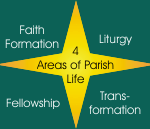

 |
|
 |
|
Homily for February 19th, 2006.
Caution: Putting a Sunday homily on the Website is tricky business. All the viewer has is a written text. A homily, on the other hand, is "an oral event". It may not have been said or heard the way it was written. In addition, a roughly ten-minute homily is part of a roughly one-hour worship event in which God and God's people communicate with each other by means of ritual, symbol, song, proclamation, prayer. Not everything in these homilies is original. As a homilist, I rely on and at times borrow from other homilists and writers who are not properly mentioned in this format. I am often indebted to them. Father William Marrevee, s.c.j.
7th Sunday of Ordinary Time Year B I wonder how we felt about that psalm refrain after the first reading: “Lord, heal my soul, for I have sinned against you”, Did we take it in stride, figuring that is the sort of language we use in church, a sort of pious line, a religious platitude, but that we have difficulty with knowing what it refers to? Or we might even feel somewhat irritated, taking the line as a downer, as a sort of accusation, driving home our unworthiness before God, the all-holy. While reactions of this sort are understandable, I think they are off target. The point of the psalm refrain, of today’s Scripture readings, of the entire Bible, of Jesus’ mission, of the Church’s ministry is not our sinfulness, our unworthiness, is not to accuse us. The point, rather is to announce, to drive home to us God’s deed of forgiveness, God’s Yes to us, as Saint Paul has it in the second reading of today. It has its origin in God’s compassion and love for us which make God reach out to us and liberate us from our sinfulness. Look at the first reading: “I am about to do a new thing; now it springs forth, do you not perceive it? I will make a way in the wilderness and rivers in the desert…. I, I am He who blots out your transgressions for my own sake.” God’s forgiveness, do we need it? Much depends on what God’s forgiveness addresses. It is not a matter of letting bygones be bygones; it is more than excusing us from a wrong move here and a stupid action there; it is even more than giving us relief from a bad conscience. It has more to do with our inability to become really ourselves created as we are in the image and likeness of God, our inability and failure to become everything God wants us to be. That inability shows itself in our half-hearted response to the many challenges and summonses that life offers us. It shows itself in our neglect of or even our outright hostility towards others that are part of our world, our cruelties and lack of love, our being mean and ungenerous, the ugliness of our deeds and/or words, our violence and war, our economic system that produces so much poverty. It is to that stuff that the compassionate and gracious God applies, as only God can, his unimaginable creativity, his new deed, his changing and transforming us into mean and women who radiate God’s compassion and kindness. God’s forgiveness makes the dead live and the ugly beautiful. Whatever is sterile and barren will bear fruit. Someone pointed out to me a beautiful image of forgiveness. You find it at the end of The Lord of the Rings. The elves give Sam some magical fertilizer. Sam scatters it around the barren land. And the next spring every tree blossoms. When we can get that psalm refrain “Lord, heal my soul, for I have sinned against you” over our lips and mean it, then we open our lives to God’s creative transformation, then we step into God’s forgiveness, into God’s space of new life. Actually, we did that when we were baptized for the forgiveness; we do so when we drink from the cup which contains the blood shed for the forgiveness of sins; ideally, we do so when we celebrate the sacrament of reconciliation, when we “go to confession”. I know that last sacrament has come upon hard times. To be honest, I think the principal reason for that is that we have made ourselves with our sinfulness the focus of that sacrament, rather than seeing God doing his new deed to us as the principal focus of that sacrament. We have made ourselves with our sinfulness the center, while here too God with his forgiveness is the principal agent. What we do is entering into God’s space of new life, into God’s forgiveness, into God’s Yes to us. And that brings us salvation, new life. Faith is daring to enter with our brokenness into God’s space, which is life-giving. |
|||||
| © Copyright 2025 Our Lady of Victory / St-Malachy Site
490 Charles Street • Gatineau • Quebec • J8L 2K5 Telephone: (819) 986-3763 Website powered by Arvixe Web Hosting |